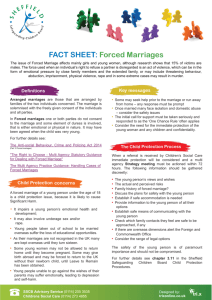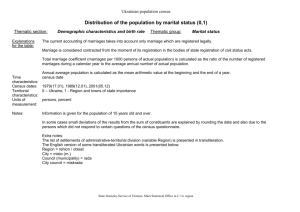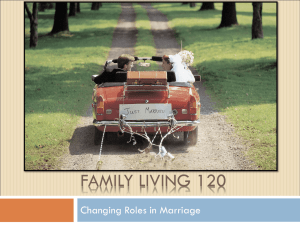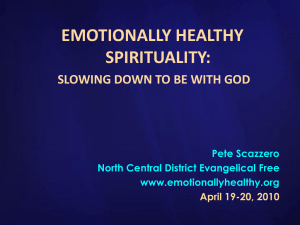Handouts-Evang-Free - North Central District
advertisement
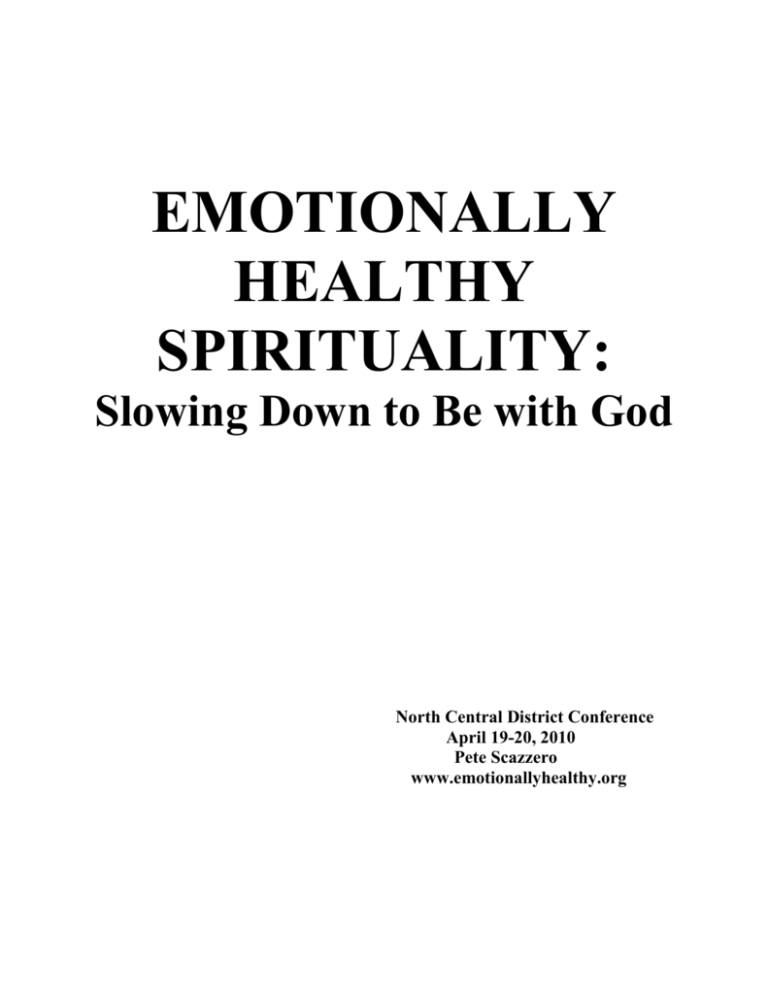
EMOTIONALLY HEALTHY SPIRITUALITY: Slowing Down to Be with God North Central District Conference April 19-20, 2010 Pete Scazzero www.emotionallyhealthy.org Session 1: Introduction and Leadership in the New Family of Jesus I. Our Journey of Four Conversions A. Becoming a Christian B. Emotional Health Emotional health and spiritual maturity are inseparable. It is not possible for a Christian to be spiritually mature while remaining emotionally immature. Different Components/Aspects of Who We Are as Image Bearers of God 2 C. Contemplative Spirituality Radically slowing down our lives to BE with God is foundational to lead FOR him. Mary and Martha (Lk.10:38-42) – Balancing Activity and Contemplation D. Slowing Down to Lead with Integrity II. Hard Lessons Learned 3 Session 2: Going Back In Order to Go Forward I. The Story of Joseph Themes Hagar Abraham Ishmael Lies Sibling Rivalry Favoritism/ Unhealthy Marriages Sarah Isaac Rebecca Esau Jacob Earthquake Events Reuben Lies Sibling Rivalry Favoritism/ Unhealthy Marriages Lies unheal Sibling Rivalry Favoritism/Unhealthy Unhealthy Marriages Marriages 2 Wives / 2 Maidservants Simeon Levi Judah Issacher Zebulaun Leah Dinah Bildah Dan Naphtali Zilpah Gad Rachel Asher Benjamin Joseph Wife Betrayal by brothers Loss of family, country, culture Prison 10 years (unjust) Mannassah “making forget” II. Ephrain “fruitful in land of suffering” Two Biblical Principles A. The Blessing and Sins of Our Families Have Impact Lasting for at Least Three to Four Generations. B. Becoming a Christian is to be Birthed into a New Family and a New Culture; Discipleship is the Process of Putting off our Sinful Patterns of our Family of Origin Then Jesus' mother and brothers arrived. Standing outside, they sent someone in to call him. A crowd was sitting around him, and they told him, "Your mother and brothers are outside looking for you." "Who are my mother and my brothers?" he asked. Then he looked at those seated in a circle around him and said, "Here are my mother and my brothers! Whoever does God's will is my brother and sister and mother." (Mark 3:31-34). 4 Genogram Worksheet Pete and Geri Scazzero © February, 2010 We look at our families, not to find fault, but to get a realistic picture of what was healthy and unhealthy so we can grow, heal and mature into our authentic selves in Christ. Fill in 1-3 through the eyes of your childhood (between 8 and 12 yrs. old) 1. Next to each family member (parents, grandparents, siblings and children) write down 2-3 adjectives describing them. 2. On the lines between your parents describe their marriage(s). Describe your grandparent’s marriages, and then your own marriage (in 2-3 words). 3. Use the symbols below to depict the relationship between family members. Use the Emotional Relationships Legend below and draw line-symbols between family members. Emotional Relationships Legend Distant / Poor Conflict Cutoff / Estranged Enmeshed Abuse Cut-offs: Avoiding communication or contact. Conflict: Issues don’t get resolved. Enmeshment: Pressure is created for family members to think, feel and act alike. (e.g. You say “yes” to a family event because you don’t want to deal with someone’s disapproval). Abuse: Severe crossing of personal boundaries – whether it be sexual, emotional or physical, severely injuring the dignity and humanity of another. Distant/Poor: Low or minimal emotional connection between family members. 4. Next to your name, describe your role in the family system? (e.g. The Scapegoat, The Golden Child, The Victim, The Fixer, The Hero, The Caretaker, The Problem Solver, The Baby, The Screw-up, The Peacemaker). Note: Consider how you birth order may have affected your place in the family and the ways you related to your family members. 5 5. On the right side of your paper, note generational themes – (e.g. addictions, affairs, losses, abuse, divorce, depression, mental illness, abortions, children born out of wedlock, etc.) 6. On the left side of your paper, note “earthquake events” in your family history (e.g. premature deaths, abuse, suicide, war, cancer, business collapse, affairs, immigration from another country, suicide, etc). 7. Summarize here the “life message(s)” you received from your: Mother/caretaker? Father/caretaker? Examples: Don’t exist. Don’t be you. Don’t have fun. Don’t be independent. Don’t make mistakes. Be quiet and obey. Don’t risk. Don’t ask questions. Don’t assert yourself. Don’t think what you think. Don’t feel. Don’t be affectionate. Don’t trust. Don’t enjoy life. Don’t ask for what you want or need. Don’t be weak. Step back and consider your genogram: 8. What might be one or two insights you are becoming aware of how your family (or others) impacted who you are today? 9. What are one or two specific ways this may be impacting your leadership in the church? 6 IV. Applications 1. Awareness of Your Family Commandments Are You Living in Your “father’s” House or Your “Father’s” House? 1. MONEY 6. FAMILY -Money is the best source of security. -The more money you have, the more important you are. -Make lots of money to prove you “made” it. -You owe your parents for all they’ve done for you. -Don’t speak of your family’s “dirty laundry” in public. -Duty to family and culture comes before everything. 2. CONFLICT -Avoid conflict at all costs. -Don’t get people mad at you. -Loud, angry, constant fighting is normal. 3. SEX -Sex is not to be spoken about openly. -Men can be promiscuous, women must be chaste. 4. GRIEF AND LOSS -Sadness is a sign of weakness. -You are not allowed to be depressed. -Get over losses quickly and move on. 5. EXPRESSING ANGER -Anger is dangerous and bad. -Explode in anger to make a point. -Sarcasm is an acceptable way to release anger. 7. Marriage -Don’t expect marriage to be a taste of heaven -Find another spouse if your marriage is too difficult. -You don’t have to work hard at marriage. 8. Listening -Listen to defend, rebut or appease. -You have nothing important to say -Hear the words; ignore the non-verbal cues. 9. SUCCESS -Is getting into the “best schools.” -Is making lots of money. -Is getting married and having children. 10. FEELINGS AND EMOTIONS -You are not allowed to have certain feelings. -Your feelings are not important. -Reacting with your feelings without thinking is okay. “Most of us live inhuman lives because we live inhuman rules about ourselves” Virginia Satir 2. Experience the Transforming Power of Gospel 7 3. The Process of Going Back to Go Forward Does Not End 4. New Skills are Needed to Create Healthy Church Community 5. Be Aware of Your Triggers/Emotional Allergies 6. Differentiation and Personal Integrity (e.g. David and Jesus) A. Working Definition -- Remaining connected to people and yet not having your reaction or behavior determined by them. My primary task, like Jesus, is to calmly differentiate my “true self” from the demands and voices around me, discerning the desires, vision, pace, and mission the Father has given me. Only Jesus was 100% differentiated. B. The Differentiation Scale 0………….……25…………………..50…………………….75…………..….…….100 8 C. Four Qualities of Differentiation Clear sense of self in close proximity to others Self-regulate anxiety and self-soothe hurts Non-reactive to other’s anxieties Tolerate discomfort for growth (David Schnarch Passionate Marriage) 9 Session 3: Contemplative Spirituality: Slowing Down to Be with God I. Present Day Realities in our Churches A. Learning from Church History B. The Desert Fathers for Today While still in the Emperor’s palace, he prayed to the Lord in these words,, “Lord lead me to salvation.” And a voice came to him saying, “Arsenius, flee from men and you will be saved.” Having withdrawn to the solitary life, he prayed again, asking the Lord to lead him to salvation. And he heard a voice saying to him, “Arsenius, flee, be silent, pray always. These are the source of sinlessness.” 10 II. The Rhythms of Contemplative Spirituality A. The Daily Office - Pausing in order to remain in His presence all day long B. The Sabbath - a 24 hour time frame without anxiety or “have-to’s” Then he said to them, “The Sabbath was made for man, not man for the Sabbath”. (Mk 2:27) 1. Four Elements to a Biblical Sabbath Stop Rest Delight Contemplate 11 2. Small groups 3. FAQ’s (see www.newlifefellowship.org) C. Developing Your Own Personal Rule of Life The Gift of a “Rule of Life” to Slow Us Down © Adapted from Emotionally Healthy Spirituality Workbook for small groups, Week 8, pgs.84-86. The phrase “rule of life” comes from the Greek for “trellis.” A trellis is a tool that enables a grapevine to get off the ground and grow upward, becoming more fruitful and productive. In the same way, a Rule of Life is a trellis that helps us abide in Christ and become more fruitful spiritually. It is a set of conscious guidelines, our unique combination of spiritual practices that help us keep God at the center of everything we do. 12 The following story and questions are meant to help you discern what may be getting in the way of developing a way of life that keeps you closely connected to God: Parker Palmer, in A Hidden Wholeness, relates a story about farmers in the Midwest who would prepare for blizzards by tying a rope from the back door of their house out to the barn as a guide to ensure they could return safely home. These blizzards came quickly and fiercely and were highly dangerous. When their full force was blowing, a farmer could not see the end of his or her hand. Many froze to death in those blizzards, disoriented by their inability to see. They wandered in circles, lost sometimes in their own backyards. If they lost their grip on the rope, it became impossible for them to find their way home. Some froze within feet of their own front door, never realizing how close they were to safety. Many of us are wandering amidst the blizzards of life and have lost our way spiritually. In your time alone with God, consider the following questions: What is the nature of your blizzard at this time? What contributes to your blizzard? What does it look like? Feel like? What does that blizzard obscure? What gets “lost”? We each need a rope to keep us connected to God. Notice that every rope is actually made up of a series of smaller, intertwined threads. In light of your life at this time, what “threads” do you want to make up your rope (Rule of Life)? 13 The following are four areas to consider to help you get started. Prayer 1. Scripture 2. Silence and Solitude 3. Daily Office 4. Study Rest 5. Sabbath 6. Simplicity 7. Play and Recreation Work/Activity 8. Occupation (Paid or Unpaid) 9. Service or Mission Relationships 10. Emotional Health 11. Family 12. Community D. Final Applications 1. Pastoral Staff Rule of Life—see www.emotionallyhealthy.org/resources 2. New Life Fellowship Rule of Life (for membership) Rule of Life for our Membership Prayer Be a lover of God, seeking to live in the love of Christ above all else. Befriend silence. Allow Holy Scripture to shape and form Christ in me. To integrate contemplative practices (e.g. Daily Offices and Sabbath-keeping) and rhythms to slow down my life. Rest Value my own dignity as a human being made in God's image through self-respect and self-care. Ruthlessly eliminate hurry. Remember God’s history of faithfulness with each new challenge. Receive God’s limits as a gift. 14 Relationships Love my neighbor as I love myself -- embracing my singleness as I bond with others, or in marriage, giving first priority to my spouse and children. Walk in community while respecting each person’s uniqueness. Apply emotionally healthy practices in order to love well. Listen more than I speak. Live in truth, asking the hard questions. Bridge racial, cultural, economic and gender barriers for Christ. Work/Activity Point others to a deep, personal relationship with Jesus. Savor the sacred in all I do -- at work, rest or play. Remember the poor and marginalized. Share my gifts, talents and resources, in and beyond our community. 3. Adjusting to Make Space for God, Ourselves and Our Marriages 15 Session 4: Emotionally Healthy Skills To Create New Culture I. Three Sample Skills A. Community Temperature Reading (see end of this packet) (Adapted from Virginia Satir) B. Stop Mind Reading You shall not bear false witness against your neighbor. Acting on assumptions, without checking them out, is a common course of confusion and conflict in relationships. Exercise 1. Reflect on something you suspect the other person thinks or feels but has not told you. 2. Ask them: “Do I have permission to “read your mind?” Or “Can I check out an assumption with you?” 3. When permission is granted, ask: “I think that you think….” or -- “I noticed that you did not return my phone calls for a few days. That’s unusual for you, so I’m wondering if you are upset with me?” Is that true?” -- “I noticed that you gave Jane and Richard a big hug but passed me over. I’m wondering if I said something or did something to annoy you?” Is that true?” 4. Response. 5. Closure C. Expectations 1. Marks of Invalid Expectations a. Un-Conscious b. Un-Realistic 16 c. Un-Spoken d. Un-Agreed upon Expectations (invalid) are ASSUMPTIONS about what someone SHOULD do. 2. Marks of Valid Expectations a. Conscious b. Spoken c. Realistic d. Agreed In order for an expectation to be valid it must be mutually agreed upon. Exercise Questions: 1. Think of a recent, simple expectation that went unmet and made you angry or disappointed. For example: I expected my husband to accompany me to my office party this past weekend. I expected to socialize with members of my small group outside the meeting times. I expected my teenager to put their dirty dishes in the dishwasher. I expected the board to give me at least a 5% cost of living raise last year. 2. Write yours down. 17 3. Compare them with the inventory questions below: conscious: Were you conscious (aware) you had this expectation? realistic: Is the expectation realistic regarding the other person? spoken: Have you clearly spoken the expectation or do you just think “they should know”? agreed upon: Has the other person agreed to the expectation? Remember this principle: Expectations are only valid when they have been mutually agreed upon. 4. Break into groups of two or three and respond to the following: What did you discover about your expectations? What step(s) can you take to make the expectation conscious, spoken, realistic,and agreed upon? 18 Session 5: Emotionally Healthy Leadership A. Dual Relationships B. Hiring/Firing (Hellos/Goodbyes) C. Joining Strategic Planning and Waiting on God D. Preaching/Teaching and the Question of Integrity E. Leadership and the Marriage Vow F. Social Media/Technology and Remaining Rooted in the Ancient Church G. The Gift of Limits: Most Things Take Longer than We Think 19 Your Next Steps 1. Begin the Journey and Engage the Message Personally (Listen to messages, MP3’s, wrestle theologically) 2. Process with Others In a Small Group (e.g. DVD and Small group - Emotionally Healthy Spirituality Workbook and Daily Office book) 3. Invite Your Wider Church to Begin the Journey (Church-Wide Initiative) 4. Visit our Website: www.emotionallyhealthy.org Visit the Blog Get on the mailing list for further resources 20 ------------------------------------------------------------------------------------------ Emotionally Healthy Spirituality Pastor/Leader Life Cycle Begin the Journey (Personal Engagement) Integration Introduce to Leadership EHS/ Rule of Life into the Church (EHS in small group) Introduce EHS to the Church Slower Healthier Life/ New Skills (Church-wide Initiative) (e.g. Daily Office, Sabbath) 21
